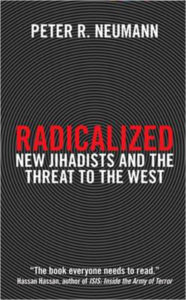
Radicalized: New Jihadists and the Threat to the West
Peter R. Neumann
I.B.Tauris & Co. Ltd (2016)
Rs1,965
As ISIS seeks to expand its reach in the Middle East, its territory serves as a base for training and operations for a new generation of jihadis. Thousands of young people from the West, primarily from Europe, have travelled to join ISIS, re-emerging as hardened fighters with military training and a network of international contacts. Many of these have now returned to their homelands, where it is feared they are planning a new series of brutal attacks. Peter R. Neumann here explains the phenomenon of the ‘new jihadis’, and shows why the threat of terrorism in the West is greater than ever before. Based on interviews and previously-unseen material, Neumann provides an essential introduction to one of the greatest crises of our time.”
Peter R. Neumann is Professor of Security Studies at King’s College London and Director of the International Centre for the Study of Radicalisation (ICSR). He is a leading expert on terrorism and radicalization, and has advised governments and international institutions on both sides of the Atlantic. He frequently appears in the media.
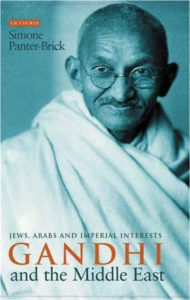
Gandhi and the Middle East: Jews, Arabs and Imperial Interests
Simone Panter-Brick
I.B.Tauris (2015)
Rs2,456
Gandhi’s involvement in Middle Eastern politics is largely forgotten yet it goes to the heart of his teaching and ambition - to lead a united freedom movement against British colonial power.
Gandhi became involved in the politics of the Middle East as a result of his concern over the abolition of the Ottoman Caliphate following the First World War. He subsequently - at the invitation of the Jewish Agency - sought to reconcile Jews and Arabs in a secret deal at the time of the Mandate of Palestine. However, Jewish and British interference coupled with the Arab Revolt and the rise of the Muslim League in India thwarted Gandhi’s efforts in the region. Like so many who would follow, Gandhi was unable to solve the problems of the Middle East, but this book for the first time reveals his previously obscure attempt to do so.
Gandhi’s experience in the Middle East was in marked contrast to his other successes around the world and is crucial for a full understanding of his life and teachings. Gandhi in the Middle East offers many new and revealing insights into the goals and limits of an international statesman at a critical period of imperial history.
Simone Panter-Brick obtained her doctorate in Law and Political Science at the University of Nancy, France. Her previous publications include Gandhi Against Machiavellism: Non-Violence in Politics.
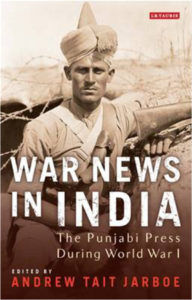
War News in India: The Punjabi Press During World War I
Ed. Andrew Tait Jarboe
I.B.Tauris & Co. Ltd. (2015)
Rs9,145
The Punjab region of India sent more than 600,000 combatants to assist the British war effort during World War I. Their families back home, thousands of miles from the major scenes of battle, were desperate for war news, and newspapers provided daily reports to keep the local population up-to-date with developments on the Western Front. This book presents the first English-language translations of hundreds of articles published during World War I in the newspapers of the Punjab region. They offer a lens into the anxieties and aspirations of Punjabis, a population that committed resources, food, labour as well as combatants to the British war effort. Amidst a steadily growing field of studies on World War I that examine the effects of the war on colonial populations, War News in India makes a unique and timely contribution.
Andrew Tait Jarboe is Assistant Professor of History at Berklee College of Music, Boston. He is also a history teacher at Roxbury Preparatory High School, Boston. He holds a PhD in History from Northeastern University and is co-editor (with Richard Fogarty) of Empires in World War I: Shifting Frontiers and Imperial Dynamics in a Global Conflict (I.B.Tauris, 2014).
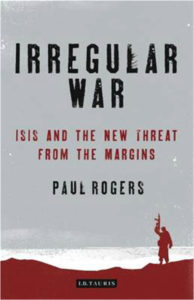
Irregular War: ISIS and the New Threat from the Margins
Paul Rogers
I.B.Tauris & Co Ltd (2016)
Rs3,112
If the rise of Islamic State can overthrow powerful states in a matter of weeks, what kind of a secure future can the world expect? After more than a decade of the war on terror, security specialists thought that Islamist paramilitary movements were in decline; the threat from ISIS in Syria and Iraq, Boko Haram in Nigeria, al-Qaida in Yemen, the chaos in Libya and the return of the Taliban in Afghanistan have all shown that to be wishful thinking. Once again the West is at war in the Middle East. Paul Rogers, the distinguished global security specialist, provides a much-needed look at the rise of such global terrorist movements from the margins and presents a new argument as troubling as it is compelling. While Islamic State has taken root in the Middle East and North Africa and has increasing impact across the world as thousands of young men and women rally to its cause, Rogers argues that it should be seen not just as a threat in its own right but as a marker of a much more dangerous world riddled with irregular war.
‘The catastrophe of the so-called ‘war on terror’ exposed in brilliant detail by the towering intellect of Prof. Paul Rogers,’ writes Owen Jones.
Paul Rogers is an emeritus professor of peace studies at Bradford University and the Global Security Consultant for the Oxford Research Group. He is a leading expert in the field of international security, arms control and political violence with over 30 years’ experience. Rogers is a regular commentator on global security issues in both national and international media, and is International Security Editor for Open Democracy. He is the author of Why We’re Losing the War on Terror, and Losing Control: Global Security in the 21st Century.
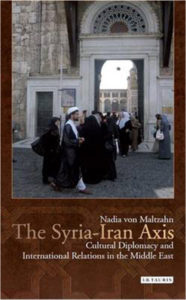
The Syria-Iran Axis: Cultural Diplomacy and International Relations in the Middle East
Nadia von Maltzahn
I.B.Tauris & Co. Ltd. (2013)
Rs2,784
Since the Iranian Revolution, the close alliance between Syria and Iran has endured for over three decades, based on geopolitical interests between the two states and often framed in the language of resistance. In view of their strong relationship at a state-level, what have Syria and Iran each been doing to foster popular exchange and employ cultural tools to build and image in the other country? The Syria-Iran Axis examines the motivations, content and reach of cultural diplomacy between Syria and Iran to determine to what degree that two partners have been successful in bridging their world views and political outlooks. Beginning with a historical background of relations between the two countries before the overthrow of the Shah, Nadia von Maltazahn offers an analysis of the process of policy formulation, and they key themes which characterize Syrian and Iranian foreign and cultural relations. Whilst the relations between the two countries were limited in the pre-revolutionary period, bilateral relations developed very quickly in the aftermath of the revolution.
Uniquely, The Syria-Iran Axis looks beyond the political and military cooperation between the leaders of these two countries, highlighting the economic and cultural connections between the populations. It therefore examines the scientific, academic, military, economic, industrial, telecommunications and cultural delegations that go back and forth between Damascus and Tehran. With key Shi’i shrines situated in Syria, such as the Sayyida Zaynab and the Sayyida Ruqayya mosques in Damascus, there has been for many years a significant level of religious tourism. Bearing in mind that these levels of inter-cultural connection have been threatened by the ongoing unrest in Syria, von Maltzahn also highlights the ways in which this key relationship has been affected by events in the wider geopolitical sphere. By examining the extent to which a state-directed cultural exchange can foster bilateral relations in the Middle East, von Maltzahn offers a unique analysis of the formation of foreign policy and diplomacy in the region.
Nadia von Maltzahn is a Research Associate at the Orient-Institut Beirut, and has in the past lived and researched in Damascus. She holds a DPhil in Middle Eastern Studies from St Antony’s College, Oxford.

